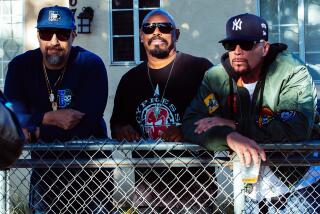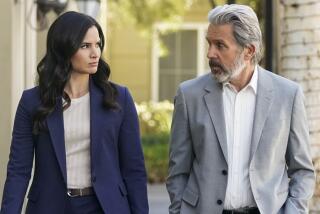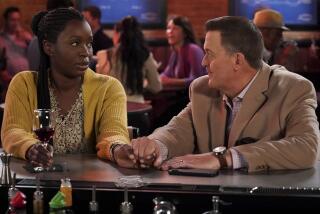The Lights Slowly Dim on ‘Northern Exposure’ : Television: The loss of a main character and its time slot were the beginning of the end for one of CBS’ most popular prime-time programs.
- Share via
In tonight’s episode of “Northern Exposure,” irascible entrepreneur and former astronaut Maurice Minnifield, played by actor Barry Corbin, sits dejectedly on a bar stool in the local watering hole in Cicely, Alaska, and laments the town’s dwindling population.
“I sunk my flag into this land,” he says. “I wanted to see Cicely grow, I wanted to see it flourish. But the population’s not going up, it’s going down. Businesses aren’t opening up, they’re closing up.”
Dr. Phillip Capra, played by Paul Provenza, is incredulous as he looks up from his seat.
“Wait a minute, Maurice,” he says. “You lured me up here with talk about double-digit growth and boom times around the corner. That’s just great. I’ve mortgaged my future to a ghost town.”
Provenza understands his character’s plight. When he joined the cast last fall, “Northern Exposure” was still a viable enterprise, an acclaimed CBS drama that consistently ranked among television’s two dozen most popular series.
Six months later, the show had all but disappeared into the Alaskan wilderness, its audience having dropped by half and its star, Rob Morrow, having left to pursue a movie career.
In a disastrous series of moves, CBS switched the show from Monday night to Wednesday night, pulled it in and out of the schedule, didn’t air it at all during the May ratings sweeps and finally canceled it at the end of the season.
Its six-season run ends rather ingloriously this month, with the final three episodes of the series airing on consecutive Wednesdays at 9 p.m., starting tonight.
“The networks always cancel quality shows and say, ‘Well, there’s just not a big enough audience for it,’ ” said Provenza, who is among many in the cast and crew who believe that CBS killed the already-weakened show when it moved it out of its 10 p.m. Monday slot. “This was a show that actually had a big enough audience, yet the network didn’t give that audience any respect.”
David Chase, one of the show’s executive producers, said that “Northern Exposure” “died a little bit before its time.”
“In the annals of broadcasting, it will be a mystery,” he said. “I think somebody will look back and say, ‘What happened there?’ A 21-share show was fashioned into a 16-share show. It’s mystifying.”
Launched five years ago tonight, the quirky series chronicled the off-beat denizens of a small town through the eyes of a fish-out-of-water New York doctor who had been assigned there to pay off his medical-school loans.
It was an almost instant hit with critics--Tom Shales of the Washington Post called it “one of those lighter-than-air vehicles that sails blissfully over the treetops”--and gradually found a devoted audience on Monday nights.
But after garnering 35 Emmy nominations--it won the award for outstanding drama series in the 1991-92 season--and making stars of its lead actors, Morrow and Janine Turner, “Northern Exposure” fell victim last season to what many of its supporters call network tinkering.
With Morrow, who played Dr. Joel Fleischman, already scheduled to depart at midseason, the show didn’t need the added problem of moving to a new night.
“It’s like the story of when you go out hunting with your brother and you accidentally shoot him in the foot,” Corbin said of CBS’ maneuverings. “You can’t stand to see him suffer, so you shoot him in the head.”
CBS gave its prime Monday time slot to “Chicago Hope,” which had lost a Thursday night ratings battle against NBC’s “ER,” and moved “Northern Exposure” to Wednesdays at 10 p.m.
“The explanation was, they felt the show was showing its age, and so they needed to invest in the future,” Chase said. “They needed to rebuild their Monday night with something that was all upswing and all future, as opposed to mostly past. So they put their chips on ‘Chicago Hope.’ ”
“Chicago Hope” thrived, but “Northern Exposure” went south.
Its last regular Monday night airing attracted 21% of the audience--its high mark for the season--but its first Wednesday night showing, aired more than three weeks later, ranked 64th during the first week in January and registered only a 16 share.
CBS preempted “Northern Exposure” for two weeks at the end of February and two more at the end of March before the show’s ratings bottomed out during the first week in April, when a Thursday night showing ranked 73rd and attracted only 11% of the audience.
“The show had been such a sensation at one time, and had been doing so well so recently,” Chase said, “that it was almost like one of those times where, all of a sudden, your friend gets this bad biopsy and you say, ‘Wait, wait, it can’t be, I’m sure the old guy is going to pull out of it,’ but he doesn’t.”
After airing only once more in April, the show was canceled.
And because the last episode had already been shot by then, the series does not go out with a grand finale. Instead, at the end of an otherwise ordinary episode that will air July 26, the characters are shown carrying on with their lives as country-folk singer Iris DeMent’s wistful “Your Town” carries the show to the credits.
“One has to be realistic: Every show comes to an end,” said Jeff Melvoin, one of the show’s co-executive producers. “But rather than sail off into the sunset to some sort of grand farewell, [this show] just slipped under the waves.”
To some, however, the show had long been treading water.
“In a perfect world, we could have ended the show when Fleischman left and it could have been a beautiful, wonderful ending,” said Turner, who played bush pilot Maggie O’Connell, the doctor’s on-again, off-again romantic interest. “We can just throw the last nine [episodes] away, as far as I’m concerned.”
Turner said that working with Morrow during the first half of the final season was “like a huge mourning process” because, in her mind, the show wouldn’t be the same without him.
“I just think that when you have a puzzle that pieces together and you take a piece out of it, there’s nothing to hold it up anymore,” she said. “So I’m thrilled [that the show was canceled]. . . .
“Another year of the show not being what it was would have just killed me and killed the memory of the show, and I wanted us to go out with some dignity.”
Turner’s view, however, is not shared by many of her colleagues.
“We will never have a chance to say whether that show could have prospered without Rob because, before any of those episodes could be aired, we were moved,” Chase said. “I don’t think it was fair to the audience, and I don’t think it was fair to a show that had performed very well. At one time, [“Northern Exposure”] and ‘Murphy Brown’ were the only bright lights on that [CBS] schedule. . . .
“They could have waited for the audience to tell them, ‘We don’t accept it,’ instead of putting out the white flag.”
More to Read
The complete guide to home viewing
Get Screen Gab for everything about the TV shows and streaming movies everyone’s talking about.
You may occasionally receive promotional content from the Los Angeles Times.






